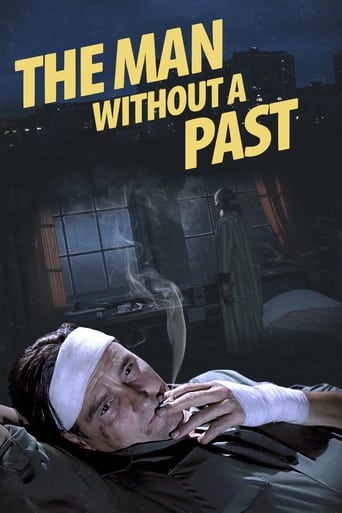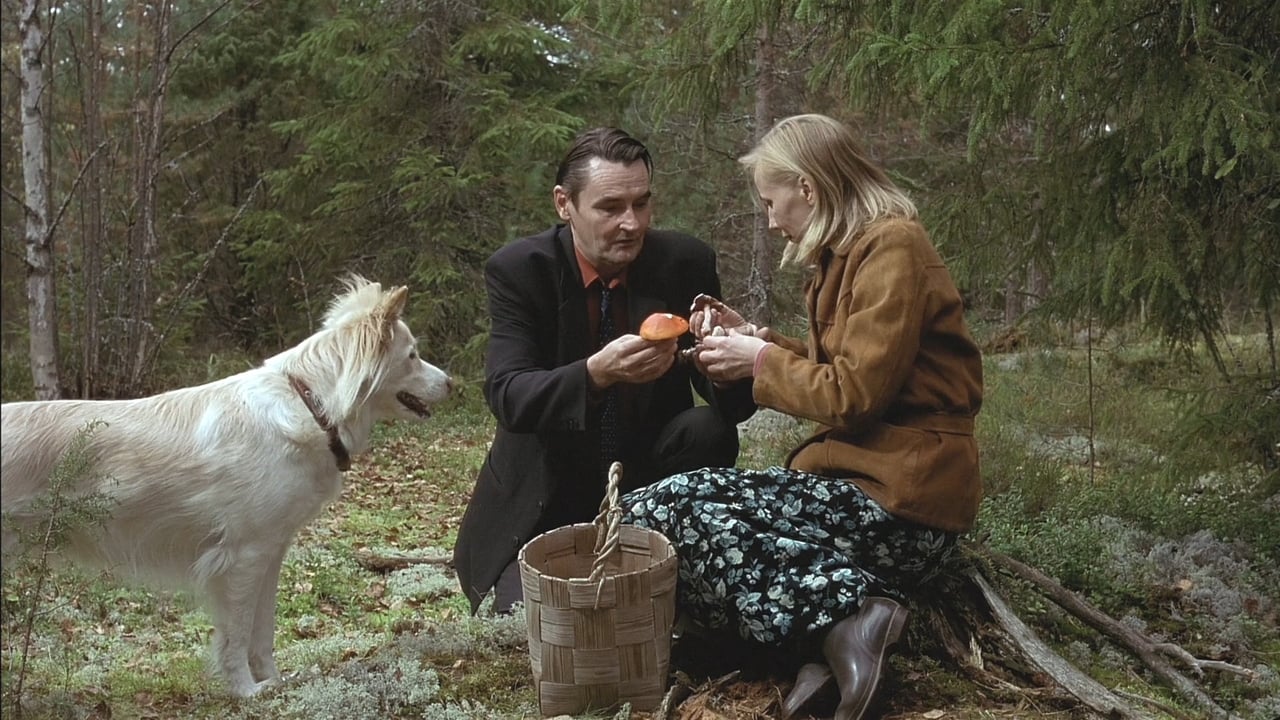Arttu Huoviala
The art of Finnish silence is beautifully captured to this Kaurismäki's movie. In Finland, one does not need words to say things. Controlled silence and meaningful looks work as well and often it isn't even recommended to speak about emotions and feeling to other people. Even when it's not a comedy it can still be funny occasionally and one can quite easily symphatize the main characters.Even though the plot is a quite easy to follow, there is a nice surprise in the end. The prejudice of Finnish melancholy gets wrecked a little with a happy ending. And it did warm my heart when the bad guys were beaten.
Ivan Lalic
Aki Kaurismaki is one of the visually most astonishing directors of the past couple of decades. Finnish movie maker blurs the line between the theater and the cinema, as well as the one between comic books and movies. "The man with no past" is no exception when it comes to color gamma and lighting.The thing that represents the major issue with Kaurismaki's flick is the script. It is too blunt and too shallow for a movie. Characters are pretty much flat from beginning to the end and their actions can be considered naive by present standards. Same thing applies for the plot itself."The man without a past" is the feast for the eye, but sadly, not for the brain as well.
heistad-933-254808
If you had the chance to recreate your life, would you be where you are now? The Man Without a Past, a Finnish film by writer and director, Aki Kaurismäki, allows one man to do just that— though not in the most ideal way. After being severely beaten by three heartless crooks, this man (Markku Peltola) wakes up on a beach inhabited by the homeless (and nearly homeless) without a single memory of his former life—not even his own name. This beach community of misfits, living on the Salvation Army soup kitchen, help nurse the nameless man back to health, and he begins his bewildering struggle to build an identity from nothing. As the nameless man (let's call him M) becomes friends with a man named Nieminen (Juhani Niemela), we see just how poor the people living on this beach are. Nieminen, we discover, is an alcoholic who spends more money on beer than his own children's dinner. Director Kaurismäki, however, does not want the audience to pity this community, but rather, to laugh at it. The people's reaction to M's bizarre situation, for example, is so blasé that they themselves become the ridiculous. "Oh, that's bad," replies Nieminen's wife when M explains his complete memory loss. Well, yes. It is. Though it seems strange to make light of homelessness, the humor is actually what allows the audience to see the characters as people instead of basket cases. When Nieminen says he will be offended if M refuses his offer to buy him a beer, we see that even though they are dreadfully poor, the people that live on this beach still have a deep sense of pride. As M becomes more involved in the community, he travels to the unemployment office in search of a job, as he hopes to live amongst his new friends. Kaurismäki presents a grim view of the welfare system: because he cannot provide a name for the application, M is accused of fraud and is thrown out of the employment office with no help. Kaurismäki, who worked as a post-man, dishwasher, and many other not-so-glamorous jobs before becoming a director, is sending a clear message: dignity is not determined by social class, but rather, by kindness and respect. Shortly after his run in at the employment office, M stumbles into a job at the Salvation Army when a worker named Irma (Katie Outinen) sees that he is highly capable. With his earnings he makes a home for himself in an old storage unit near Nieminen's trailer. Among his few possessions is an old jukebox that blasts 1950s rock 'n' roll music, its lively beat invigorating the slow-paced film. Now M's love interest, Irma—the shy, conservative employee at the Salvation Army who secretly listens to American hits before bed— is easily wooed by his taste in music and unabashed affection for her. Like in M's relationship with Irma, actor Peltola is able to subtly weave M's character into our hearts until, eventually, we realize we've been rooting for him all along. Outinen too is a superb actress. Though she has few lines, when her character Irma is with M, her expression perfectly conveys both the discomfort of an unfamiliar situation and a desire to know what will happen next. Irma is not the only one who M brings out of their shell. M teaches The Salvation Army band, which previously knew only one song (which was, quite simply, a drag), about the glory that is rock 'n' roll. They soon put on a show with the director of the Salvation Army, a woman we learn who has wanted to be a singer her whole life, and the whole community comes together to listen. Things take a turn for the worse for M, however, when he is a witness to a hilariously simple bank robbery: one man and his rifle. The bank clerk nonchalantly brings out the money while M just stands there obliviously. "I'm sorry I have to do this," the robber says, locking them in the vault, to which M replies that he understands given the situation at hand and not to worry about it. Like the idea of a man with severe brain damage waking up in a homeless village and starting a new life with no questions asked, it's the kind of hilarious that hits you three days later when you're brushing your teeth. Unfortunately for M, the police don't find it so funny. Kaurismäki again shows a distaste for state institutions as the police unlawfully detain M for not giving them his name. Irma comes to the rescue, sending M a lawyer who promptly gets M his freedom whose face, we discover, has been plastered across newspapers with the headline "Who is this man?" On his way back to his new home, M is told that his wife contacted the police when she saw his picture in the paper and that he can go back home. But where is home, anyway? M can take back his name, and with it his old life, or he can choose to stay with Irma and his unconventional friends. At the end of this fantastically funny film, Kaurismäki presents a dramatic ultimatum that will change everything for M, as The Man Without a Past is now the man with two futures.
lanman-678-734085
Centered on a man suffering from amnesia and a loss of identity, Aki Kaurismaki's The Man Without a Past is a "comedic" documentary on his upbringing in cinematic form. This film is part of trilogy which focuses on themes experienced by Kaurismaki growing up; for instance homelessness, unemployment, and loneliness. Although labeled as a comedy, it is a lot more amusing to those familiar with Finnish society. To a person from the states, the movie seems dry and emotionless. But to anyone familiar with Finnish society, this is very normal. Fins aren't very keen on showing emotion, expressions, or even small talk-unless drinking is involved.A metal worker, whom the film refers to as "M" in the credits played by Markku Peltola, arrives in a strange city by train, and is mugged on a park bench by goons and left for dead. He escapes the hospital and is found near a river and brought in by a family. He finally comes to and has lost not only his shoes-removed by a passing bum-but also his memory of anything in his previous life. But while he is now alienated from himself and roaming a Finnish landscape surrounded by poverty, M is also unshackled.M's life as a laborer has left his hands callused and his face evident of wear and tear, but his new life has new meaning. He finds friendship among other homeless "clients" of the Salvation Army, a new home in an old shipping container, and romance with a mellow Salvation Army worker, Irma played by Kati Outinen. Homelessness is viewed differently than it is in the states. It is looked at as more of a housing problem than a social problem. In addition to M being homeless, Kaurismaki also shows us a homeless man living in a dumpster, which M actually befriends.The characters, in spite of their air of despondent expressionless, expose their oddities, their passions and the oddball dignity that unites them. The film highlights the sense of community felt between its members. In addition to Irma, the man's new companions include an sociable drinker Nieminen, played by Juhani Niemela, and his family, and Antilla, played by Sakari Kuosmanen, a security guard who is landlord of the shipping-container shantytown and who fancies himself a ruthless and fearsome enforcer of law and order.Kaurismaki wanted his social, economic, and political ideas to be on display in this film. Kaurismaki's fascination with the past, both music and movies, is apparent throughout the film. M's love for music survived his memory loss beating and even calls for a reformation of the Salvation Army band to play more "rhythm music," or blues, R&B, and rock n' roll. After establishing himself in a house, M also commandeers a jukebox which constantly spits out "rhythm" music, again attesting to Kaurismaki's obsession with vintageness.On the evidence of this hilarious and humane movie, these views are, like those of any great artist, at once perfectly clear and not easily summarized. His ethical ideals are perhaps most succinctly expressed in an exchange between the hero and a worker from the municipal utility company who runs a cable from a nearby power line to the man's makeshift home (and later helps repair the jukebox). The electrician brusquely refuses payment, asking only the promise of future consideration in exchange for his favor: "If you see me lying face down in the gutter," he says, "turn me on my back."


 AD
AD


